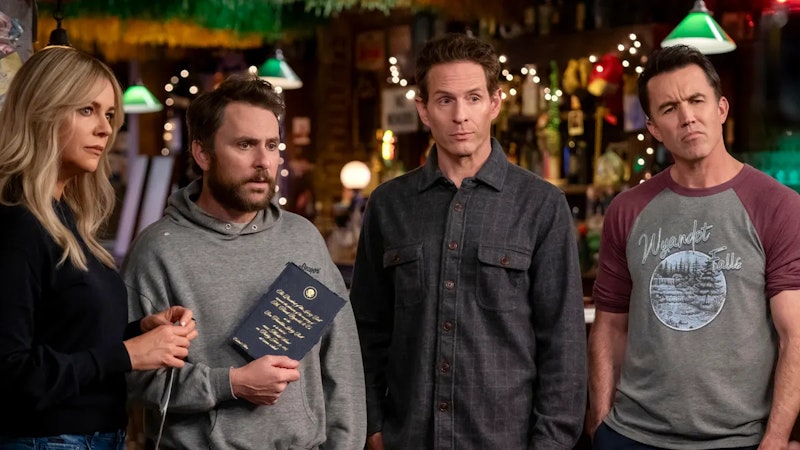When it made its debut in 2005, It’s Always Sunny in Philadelphia reflected the brash, experimental spirit of the FX Network, which offered the type of exploitative storytelling that wasn’t present on other linear networks or basic cable channels. HBO may have pushed it with the sex and violence of The Sopranos and The Wire, but it was still a subsidiary that made made-for-television films and worked hand-in-hand with Steven Spielberg. With The Shield and Nip/Tuck, FX pioneered acidic social commentary, and turned controversial topics into engaging serialized dramas. Comparatively, It’s Always Sunny in Philadelphia offered a cynical antidote to the wholesomeness that had infected the sitcom market.
NBC’s “Thursday Night Lineup” of The Office, Parks and Recreation, 30 Rock, and Community was designed as "comfort food” for an audience that simply enjoyed the opportunity to see their favorite characters on a weekly basis. That wholesomeness was absent from It’s Always Sunny in Philadelphia, as the narcissistic pub owners Mac (Rob Mac), Dennis (Glenn Howerton), Dee (Kaitlyn Olson), and Charlie (Charlie Day) engaged in nefarious deeds. Even if It’s Always Sunny in Philadelphia was satire, co-creators Mac and Howerton appealed to the subversive desire that viewers had to watch these anti-heroes wreak mayhem in society.
Longevity is impossible within the current television ecosystem, and even acclaimed comedies like The Good Place or Schitt’s Creek operated with a fixed schedule, as their cast and crew inevitably moved on to other projects. The crew for It’s Always Sunny in Philadelphia never had that issue because of the possibilities within the medium they invented; between trippy nightmares, elaborate heist capers, raunchy sex comedies, and intense crime thrillers, It’s Always Sunny in Philadelphia encapsulated various genres. It’s Always Sunny in Philadelphia has always invited viewers who have dipped in and out over the years.
The sentimentality that has become common within comedy is almost entirely absent from It’s Always Sunny in Philadelphia; the characters have changed, but not necessarily evolved over the course of 20 years. Even the show’s acclaimed avant-garde installment “Mac Finds His Pride,” in which Mac’s character publicly came out as gay, had emotional impact because of its real-world representation; Mac may have gained newfound confidence, but the character wasn’t transformed into an overnight saint.
It’s Always Sunny in Philadelphia hasn’t suffered the same decline in quality experienced by comedies like Friends or Scrubs; each season has had more than a few standout episodes. Perhaps that’s a low bar, as Howerton, Mac, Day, and Olson have such chemistry that it’s not surprising they could elevate the material. However, It’s Always Sunny in Philadelphia felt more radical because of the lack of self-importance it had within the comedy space. Emmy-nominated shows like The Bear, Hacks, Barry, and Atlanta may have contained wonderful filmmaking, but rave reviews rarely described them as “funny.” Even though It’s Always Sunny in Philadelphia often contained thoughtful satire about the parasitic nature of the American dream, the show rarely touted its subtext as its defining characteristic.
What’s most impressive about the 17th season is its ability to be reflective, but not nostalgic. The recent episode “Overage Drinking: A National Concern” served as an unofficial sequel to the first season’s “Underage Drinking: A National Concern,” and featured the return of guest characters Trey (Robert Adamson) and Tammy (Jaimie Alexander). Rather than a celebratory callback, the new episode is an amusing consideration on how Dee and Dennis ruined the lives of two teenagers, who are now dysfunctional adults. It’s the type of episode that would only work within a show that’s been on the air for 20 years. While it's surpassed in overall length by some animated shows, The Simpsons and Family Guy haven’t retained the same head creative team for the entirety of their existence.
The current season has also danced around lingering questions about its future without the establishment of any outstanding commitments. Danny DeVito has been a main cast member since the second season, in which he was introduced as Frank Reynolds, the absentee father of Dennis and Dee. Although the network’s insertion of an established star into a settled dynamic would seemingly have irritated creators as individualistic as Howerton and Mac, DeVito’s was an essential member of the cast, and opened up a new chapter within his career. Given that DeVito is 80, it’s fair to question if It’s Always Sunny in Philadelphia had a plan to write him off. While a recent episode teased that Frank would never awaken from a coma, it's later revealed as a set-up for a gag, in which he is accepted as a contestant on The Golden Bachelor.
The lack of pre-planning has given It’s Always Sunny in Philadelphia the opportunity to adapt to changes in the world, as the show has tackled such issues as the financial crisis, censorship, healthcare risks, and social media misinformation. Dennis was negated to a guest star status when Howerton briefly entertained the idea of starring in a different show, and Day’s real-life bride Mary Elizabeth Ellis has been given a more recurring role. Given that It’s Always Sunny in Philadelphia has always operated by its own rules, it doesn’t feel opportunistic for the creators to work and write around their personal lives.

